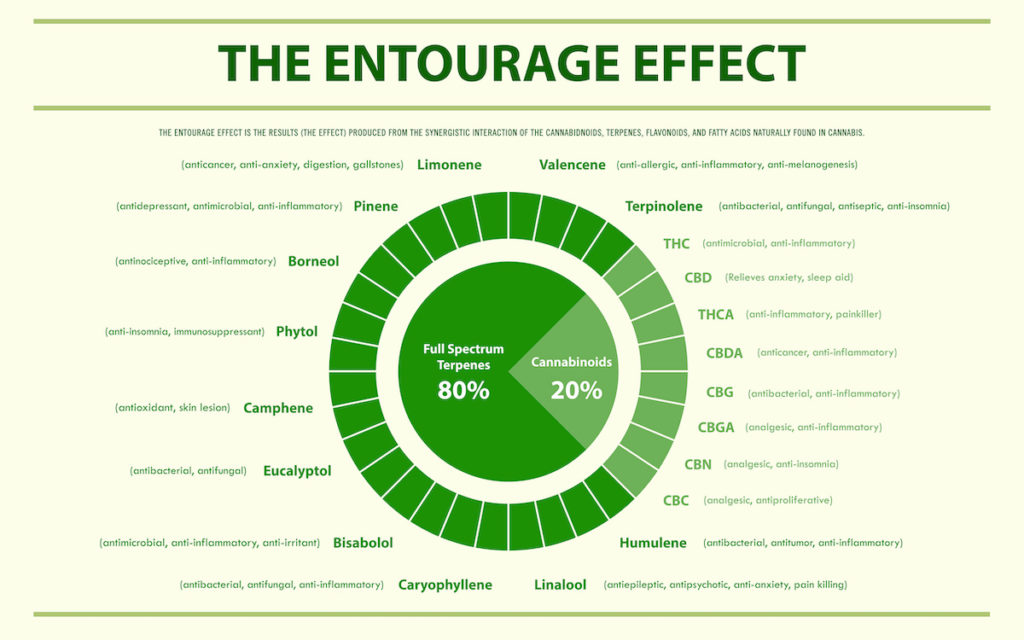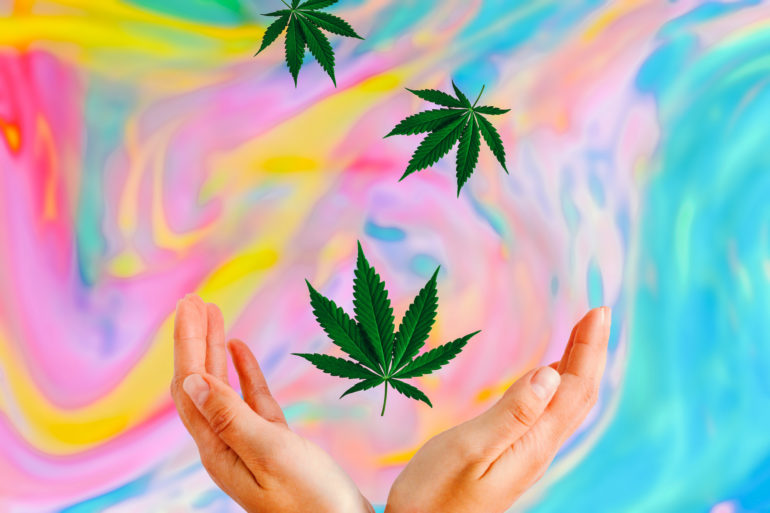The entourage effect is a term used throughout the cannabis industry. By definition, it’s the combined effect of various plant compounds (cannabinoids, terpenes, flavonoids, etc) present in varieties of cannabis all working together in synergy. This synergy is said to provide your mind and body with enhanced health and wellness benefits by interacting with your endocannabinoid system (ECS).
Despite some positive and interesting studies on the entourage effect, all produced by leading cannabis scientists and experts, new evidence casts doubt on how it actually works and whether it’s even a real thing.
So, what do we know about the entourage effect? Is it real? Does it provide your mind and body with enhanced benefits?

TL;DR
- The entourage effect is a promising and exciting phenomenon where certain cannabis plant compound combos produce enhanced benefits in your body e.g. THC + CBD + linalool + limonene = anti-acne
- CBD + THC teamwork is widely accepted — CBD may tame THC side effects, causing a more balanced cannabis experience with overwhelming anxiety, fear, and paranoia
- Looking for the best extract type for the entourage effect? Broad-spectrum and full-spectrum extracts are your best bet
- Hemp and marijuana consumption may produce the entourage effect but for different conditions e.g. hemp or low-THC, high-CBD marijuana for anxiety
- While research on the entourage effect is largely positive, don’t be mistaken — some researchers believe it’s overstated and unsubstantiated, and more research needs to be done
What we know about the entourage effect
What we really know about the entourage effect is there’s so much more to learn. We’re really just scratching the surface. The idea that cannabis compounds may work together in synergy was actually discovered fairly recently.
In 1998, a group of notorious cannabis scientists, led by none other than prolific biochemist Dr. “The Father of Cannabis” Mechoulam, uncovered something truly remarkable about your endocannabinoid system, specifically 2-arachidonoylglycerol (2-AG).
2-AG is an endogenous molecule similar to THC, able to bind to both cannabinoid 1 (CB1) and cannabinoid 2 (CB2) receptors. Upon closer inspection of this molecule, the team found two separate inactive compounds paired with it: 2-linoleoylglycerol and 2-palmitoylglycerol.
Neither compound activated cannabinoid receptors but could help 2-AG bind to them more efficiently, which boosted its pain-relieving qualities.
Since then, researchers have attempted to piece together how certain cannabis compounds actually work together within the body with very interesting but conflicting results.
The CBD + THC entourage duo
It’s widely accepted that CBD and THC interact with each other, often with positive results. CBD, for instance, is thought to reduce THC-induced anxiety and fear, which typically happens after consuming way above your THC limit.
So, how does CBD potentially reduce THC symptoms? It’s a little complex but let us simplify it for you.
- THC fear and anxiety can happen when it binds to cannabinoid 1 (CB1) receptors in certain areas of the brain (amygdala). When these receptors are flooded with THC, it causes significant overstimulation, resulting in a negative cannabis experience
- CBD does the opposite. It doesn’t bind to these receptors at all. Research shows it may position itself in a different region on the receptor, causing it to change its shape and not allow THC to bind successfully.
What about a CBD + THC + terpenes entourage trio?
According to a 2011 review of cannabis studies, there’s the potential for certain cannabinoids and terpenes to work together in synergy. Terpenes, by definition, are aromatic compounds present in a variety of plants, fruits, herbs, and varieties of cannabis. Terpenes give cannabis its distinct flavor and aroma.
When terpenes (and other cannabinoids) are involved in the entourage synergy, there’s a suggestion these specific combinations may help with the following:
- Acne — CBD + THC + linalool + limonene
- Anxiety — CBD + THC (lower quantities) + limonene + linalool
- Dementia & Alzheimer’s — CBD + THC (lower quantities) + limonene + pinene + linalool
- Depression — CBD + CBG + THC + limonene
- Methicillin-resistant Staphylococcus aureus (MRSA) — CBD + THC + CBG + pinene
- Sleep issues & insomnia — CBD + THC + CBN + caryophyllene + linalool + myrcene
Cannabinoid + terpene ratios needed for this entourage phenomenon
The exact ratios needed to initiate CBD + THC + terpene entourage benefits are difficult to pinpoint, simply because the research just isn’t there yet. However, we can give you a rough idea of the ratio needed for optimal benefits.
Let’s say, for example, you have anxiety or anxiety-related issues. High quantities of THC without a balanced amount of CBD aren’t going to help you here. Flooding your brain with THC can cause overwhelming anxiety, fear, and paranoia. CBD is thought to counteract this.
If you consume high-THC marijuana for anxiety, make sure the product has at least an equal balance (1:1) of CBD and THC, alongside antioxylic terpenes such as linalool, linalool, and geraniol.
Hemp vs. marijuana for the entourage effect
Using hemp or marijuana for a CBD + THC + terpene entourage effect is down to your own personal requirements. Cannabinoids and terpenes are no different in either variety, but the quantities held in both differ quite significantly.
Hemp-derived products carry far less THC (<0.3%) than marijuana-derived products, making them totally non-intoxicating and non-psychotropic. Marijuana-derived products are psychotropic and intoxicating, producing a pretty heavy high in most cases.
Without proper data, we can’t conclusively say which is a better choice for specific conditions, but we can say you’ll have a better chance with full-spectrum CBD products with a wide range of cannabinoids and terpenes (incl. THC).
Which hemp CBD extracts are best for the entourage effect?
The best hemp CBD extracts to potentially spark cannabinoid + terpene synergy are the ones with a fuller range of plant compounds. You have three options here:
- CBD isolate extract — Carries only CBD with no other cannabinoids, terpenes, flavonoids, or any other plant compounds. Practically useless if you’re looking to experience cannabinoid + terpene synergy.
- Broad-spectrum extract — Contains all broad range of plant compounds (CBD, CBG, CBC, terpenes, flavonoids, etc) without any THC. Thought to produce partial entourage synergy.
- Full-spectrum extract — Contains a full range of plant compounds including THC. A really popular choice among cannabis and CBD consumers. Will produce a full CBD + THC + terpene entourage effect.
An entourage spanner in the works
In 2020, twenty-two years after Mechoulam and his team first discovered the entourage effect blueprints, an entire review of entourage effect research was published. The author criticizes the questionable rebranding, marketing, and expectations surrounding the entourage effect, stating:
Claims of a cannabis entourage effect invoke ill-defined and unsubstantiated pharmacological activities which are commonly leveraged toward the popularization and sale of ostensible therapeutic products. Overestimation of such claims in the scientific and lay literature has fostered their misrepresentation and abuse by a poorly regulated industry.
So, the entourage effect is just a marketing ploy then?
The entourage effect isn’t rubbish, per se. We know there’s a CBD + THC entourage that’s enhanced by specific terpenes (in some cases). However, on the whole, the phenomenon is vastly overstated and requires more research beyond what certain brands state in their marketing blurb.
This isn’t really surprising, to be honest. As nice as it is to hear full-spectrum CBD products or high-grade marijuana flower combine every plant compound into a powerful therapeutic force, there’s not enough evidence to support this. It doesn’t perform unsubstantiated miracles.
In fact, researchers believe the lack of controlled, double-blind clinical trials makes the entourage effect incredibly difficult to verify. Instead, we rely heavily on anecdotal evidence to support this synergistic phenomenon.
Is anecdotal evidence the strongest evidence we have?
Not necessarily. Anecdotal evidence has its own flaws and cannot be substituted for real scientific research, but shouldn’t be ignored either. Many cannabis users believe there is an entourage effect when consuming full-spectrum CBD (with <0.3%) and marijuana-derived products. These effects include heightened pain and inflammation reduction, enhanced relief from anxiety and its symptoms, and a general boost to health and wellness.
Reliance on anecdotal evidence is partially the product of strict government prohibition
Cannabis has been federally prohibited for decades. Legal restrictions on marijuana, which is still federally illegal and classified as a Schedule I controlled substance, make it very difficult for researchers to obtain phase II clinical trial approval. If clinical trials are approved, there are strict guidelines and unfair limitations on publishing the resulting data.
It’s, therefore, blindingly obvious why there are only a handful of clinical trials on the entourage effect, some of which merely speculate its occurrence in your body, not verify it totally.
This is why anecdotal evidence and exaggerated claims made by cannabis brands are often seen as gospel, even though there’s a question mark over their scientific grounding.
